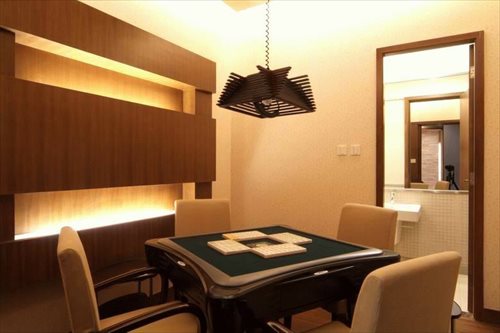Getting into the game
Expats embrace one of China’s most popular pastimes: mahjong
The sounds of clinking plastic tiles and relaxed chatter fill the air at a downtown restaurant where Emma Harris sits with three other expatriates around a table. Members of the quartet keep their hands busy grabbing and discarding domino-like pieces while occasionally reciting Chinese phrases like "yi wan" (one character), "er tiao" (two bamboos) and "jiu bing" (nine circles). After a few rounds, Harris bursts out with a triumphant "oho!" and proudly displays her tiles to show that she has won.
Their game in question is mahjong, a traditional Chinese tabletop game played with 144 tiles bearing an assortment of symbols and graphics. At the start of each game, four players each receive 13 tiles, which are then drawn and discarded until one player comes up with a winning hand of four "melds" and a pair.
Su Min, a Chinese teacher from Fly Mandarin School, stands nearby to guide Harris and her fellow foreign classmates turned opponents as they learn the ropes of this quintessentially Chinese pastime. Before the games got started, Su had given a detailed presentation covering not only the rules and basic principles of mahjong, but also the Chinese names of the various pieces.
"It was a little difficult to understand at first but it started to make sense after a few times playing. To me, mahjong is simply irresistible and learning itself is a lot of fun," Harris said.
Skill and luck
With a long and rich history throughout Asia, mahjong's appeal within Shanghai's expatriate community is growing. Foreigners are drawn to the game for many reasons, including its intellectual and social aspects.
"I think it's a really good social activity that you can enjoy with friends or use to meet new people, just like playing card games," said Krys Piotrowski from the UK. "It's not too difficult to learn the basics. I've always played card games with my family at Christmas, so when I go back home this year I plan to teach them mahjong."
Nicolas da Costa, a South African student from Fly Mandarin, asked his Chinese friends where he could buy a mahjong set after the game ended. "Mahjong is a fascinating mind game as it always gives one a mystery to solve, while there is also a certain degree of chance involved, which makes the outcome unpredictable," da Costa said.

Foreign residents in Shanghai learn to play mahjong. Photos: Courtesy of Fly Mandarin School

Foreign residents in Shanghai learn to play mahjong. Photos: Courtesy of Fly Mandarin School
"Mahjong is a game of skill and calculation. It really keeps your brain active and working. You need to think before pulling out any tile, figure out a strategy to win and be aware of other players. Besides, it brings people closer through chitchatting while playing," said Carlos Botilo Jr. from the Philippines. Botilo Jr., Harris, Piotrowski and da Costa are all students at Fly Mandarin, a language teaching company that offers mahjong classes as part of its activities to foster students' interest in China.
"Playing mahjong is an effective way to integrate with local culture," said Su. "We offer a variety of Chinese cultural activities besides mahjong; like calligraphy, paper cutting, Chinese painting and making dumplings, which are quite attractive to many of our foreign students."
Where to play
Elderly Shanghai residents usually set up mahjong tables in lanes or teahouses while young people usually prefer playing at commercial establishments. The Global Times has found three recreational mahjong parlors where you can battle it out with friends.
Que Sheng Hui Board and Card Games Club
Located in downtown Jing'an district, Que Sheng Hui (418 Wuning Road West, 5108-3833) is primarily frequented by local office workers.
The club features 16 private mahjong rooms (pictured below), all of which bear the name of various mahjong terms such as "qing yi se" (pure hand) and "da san yuan" (three great scholars).

Que Sheng Hui features 16 private mahjong rooms. Photo: Courtesy of the club
Price ranges from 25 yuan ($4.05) to 75 yuan per hour depending on the type of room. Outside food and drinks prohibited.
Day Day Holiday
For young people looking for something different, Day Day Holiday offers a perfect choice. Its four branches all feature different styles of décor, yet all provide a homelike atmosphere.
Private rooms are available, but limited availability means that reservations are required.
Besides throwing a wild mahjong party, visitors can also play board games, table tennis and poker - not to mention video games on popular platforms like the Nintendo's Wii and Sony's PlayStation 3. Day Day's Xuhui branch (No.8, Lane 2200 Xietu Road, 5306-1816) also features a second-floor terrace decorated with flowers, swings and rocking chairs.
Access to free Wi-Fi services is offered. Visitors can bring their own food or order from Day Day's menu. Each customer is charged 68 yuan.
Yu Bian Hui
Opened in 2008, Yu Bian Hui (3/F, 1579 Xietu Road, 3416-0160) is very popular with locals and Japanese expatriates.
As one of the city's classiest mahjong parlors, each mahjong room has Wi-Fi access and a private washroom.
Yu Bian Hui also offers foot massages to help unwind after a long day at work. Snacks and dishes can be ordered at the parlor.
Price ranges from 15 yuan to 25 yuan per hour. Open 24 hours a day.
Newspaper headline: Expats embrace one of China’s most popular pastimes: mahjong